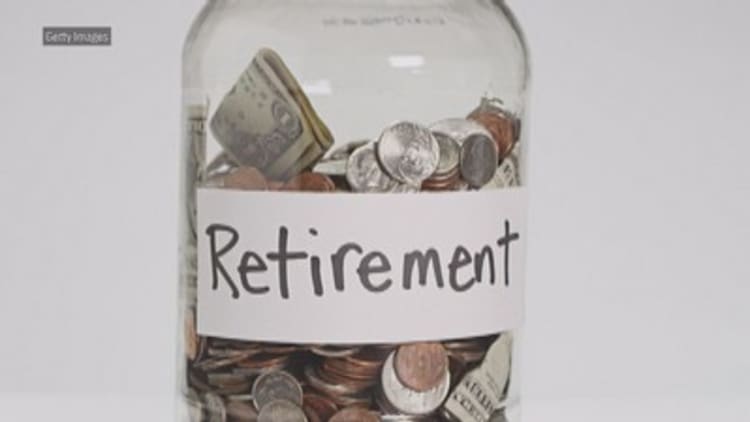Here's a question for anyone who's about to leave an employer: Are you keeping your money in the retirement plan, or are you taking your savings with you?
For companies that provide workplace retirement plans, that's a $9.2 trillion question — that's the number of assets held in individual retirement plans as of the end of 2017, according to the Investment Company Institute.
These 401(k) record-keepers have a bird's eye view of employees' savings and they are in a prime position to contact plan participants about rolling over their balance into an IRA with them — which may not always work out in favor of departing workers.

"They will try to take you out of your 401(k) and put you into a suboptimal IRA rollover," said Anthony Isola, a financial advisor at Ritholtz Wealth Management in New York.
"You can go from a 401(k) plan with an expense ratio under 1 percent to a rollover with costs of 2 to 3 percent, which is very substantial," he said.
"If I were to ask you, 'Do you value low-cost investments with fiduciary oversight?' You'd say, 'Yes, of course,' and you'd keep your assets in the plan."James Venerusosenior vice president, Callan
Wells Fargo made headlines in late April, following a report from The Wall Street Journal that the Labor Department was investigating its 401(k) practices and examining whether the bank is pushing 401(k) plan customers into more costly IRAs.
Wells Fargo spokeswoman Leslie Ingberg referred back to a March 1 filing with the Securities and Exchange Commission, wherein the bank's board disclosed that it was reviewing activities in its wealth and investment management unit "in response to inquiries from federal government agencies."
Wells Fargo's board is "assessing whether there have been inappropriate referrals or recommendations, including with respect to rollovers for 401(k) plan participants, certain alternative investments, or referrals of brokerage customers to the Company's investment and fiduciary services business," the bank said in its SEC filing.
The Labor Department would neither confirm nor deny the existence of an investigation.
Here's what you should know when your 401(k) plan record-keeper contacts you to talk about an IRA rollover.
Changing practices
The Labor Department's investor protection rule, which would have required financial advisors working with your retirement savings to act in your best interests, shined a spotlight on 401(k) record-keepers and the rollover conversations they would have with departing employees.
More from Investor Toolkit:
Medicare doesn't cover everything. How to avoid surprises
Here's how much an estate plan should actually cost to prepare
Do you really want your ex-spouse to get your inheritance? It's time to update beneficiaries
"There is more of an awareness around the conversations taking place between service providers and participants around that decision and the extent to which they were steering people into proprietary IRA products," said James Veneruso, senior vice president at Callan, an investment consulting firm.
Employers who hold onto departed employees' 401(k) assets have better bargaining power to negotiate lower investment fees for the plan.
However, companies that keep these assets continue to act as fiduciaries and may face litigation risk from those ex-employees.
As of late, more companies would prefer that workers who are on their way out leave their savings in the 401(k) plan. See below.
A change in demographics — the large number of workers retiring and the big slice of assets they command — is a possible reason why plan sponsors are changing their approach, Veneruso said.
A costly decision
The way a representative from a 401(k) plan record-keeper presents the question of "stay or go?" can nudge the employee into a course of action.
"If I were to ask you, 'Do you value low-cost investments with fiduciary oversight?' You'd say, 'Yes, of course,' and you'd keep your assets in the plan," said Veneruso.
"If I lead with 'Do you value choice, rather than choosing from the limited number of funds in your lineup,' you'd prefer choice and you would go with the IRA," he said.
Indeed, 401(k) plan costs have been declining over time. The larger the plan, the lower the expense. See below.
At the same time, switching to an IRA can come with higher costs, such as the 1 percent asset under management fee a financial advisor may charge.
However, if you're paying for comprehensive advice, you're getting individualized guidance that you might not be able to find in your 401(k) plan.
"Advisors can demonstrate value — it's tied to planning," said Douglas Boneparth, president of Bone Fide Wealth in New York.

Ask questions
Don't just roll with what your plan service provider suggests. Here are a few questions to ask before you decide whether to stay or go.
- Compare your costs: Large retirement plans have access to low-cost investments. This may not be the case for a small retirement plan. Find out how costs compare between your 401(k) and an IRA. "Don't rely on the record-keeper to give you the right information," said Isola.
- Learn about your in-plan options: If you stay in the plan, will you be able to draw down from your funds through retirement? If so, find out whether there are fees for transferring your savings to your checking account.
"Usually, there's a distribution fee and a wire fee if you can wire the money," said Aaron Pottichen, president of retirement services at CLS Partners in Austin, Texas. - Think about how to invest your savings: Even if you leave your money in the plan through retirement, consider how you might want to allocate your funds to protect your principal. The answer to that question will vary based on the investor. Plan sponsors are grappling with this issue, Veneruso said.
"What can you say to them without necessarily telling them what to do?" he asked. "What guidance can you give without straying into advice? There is no clear answer to that yet."






